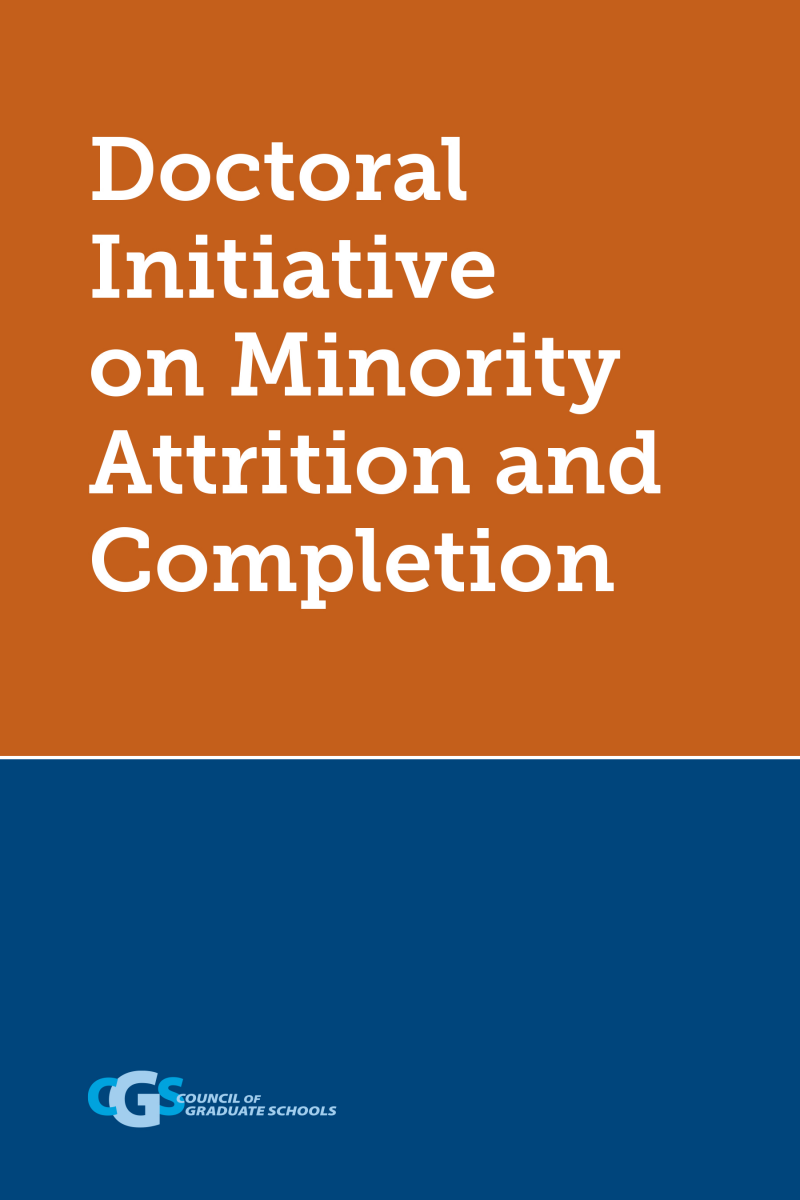You are on CGS' Legacy Site.
Thank you for visiting CGS! You are currently using CGS' legacy site, which is no longer supported. For up-to-date information, including publications purchasing and meeting information, please visit cgsnet.org.

Over the past several decades, researchers have highlighted the fact that there is a general underrepresentation of minority (URM) students—particularly African American, American Indian, and Hispanic students—in science, technology, engineering, and mathematics (STEM) fields at the graduate level. The problem of underrepresentation in doctoral education and the academic workforce is exacerbated by the fact that attrition rates from doctoral programs tend to be very high.
With a grant from the National Science Foundation (NSF grant #1138814, "Completion and Attrition in AGEP and non-AGEP institutions"), the Council of Graduate Schools (CGS) examined patterns of completion and attrition among URMs in STEM doctoral programs across twenty-one institutions in the United States, including those institutions affiliated with NSF’s Alliances for Graduate Education and the Professoriate (AGEP) program. The project has assembled the largest dataset of its kind to estimate the percentage of URM doctoral students in STEM fields who completed or withdrew from their program and the time it took them to complete the doctoral degree. The project also sheds light on the range of supports available at institutions to assist these students using input from URM doctoral students enrolled in STEM programs, as well as university personnel. Furthermore, as a part of the project, CGS convened the AGEP National Forum in Washington, D.C. in February 2017.
Project Outcomes
The project resulted in the following publication:
Doctoral Initiative on Minority Attrition and Completion
Online Appendices
Press Release
In the News:
Helping Minority Ph.D.’s in STEM: Something’s Working (Chronicle of Higher Education, 4/14/2015)
Missing Minority Ph.D.s (Inside Higher Ed, 11/4/2014)
Alliance for Graduate Education and the Professoriate (AGEP) National Forum
The AGEP National Forum convened February 23-24, 2017, at the Grand Hyatt Washington. The forum had the following goals:
- To serve as a forum for exploring promising practices with the potential to significantly improve the diversity of graduate students and the professoriate in science, technology, engineering, and mathematics (STEM) fields,
- To develop a network for sharing and fostering community among AGEP grantees, and
- To provide a platform for NSF to engage AGEP grantees by sharing its strategic priorities, policies, and procedures designed to facilitate STEM doctoral programs inclusiveness.
One of the highlights of the AGEP Forum was the Networking Reception and Poster Session. During this session, each AGEP Alliance and Project presented their work and activities, as well as its impact.
Resources for Graduate Deans and Researchers
Data collection instruments employed in this project are available for public use, allowing non-participating graduate schools to collect their own data to benchmark against the project findings. Word/Excel and PDF versions of these instruments are available below.
| Data Collection Instrument for Student-level Data | Instruction (.pdf) | Instrument (.pdf) | Instrument (.xlsx) |
| Inventory of Policies, Programs and Procedures | Instruction (.pdf) | Instrument (.pdf) | Instrument (.xlsx) |
| Instrument for the Doctoral Student Survey | Instrument (.pdf) | Instrument (.docx) | |
| Protocol for Student Focus Group Sessions | Protocol (.pdf) | Protocol (.docx) | |
| Demographic Information Questionnaire for Student Focus Group | Questionnaire (.pdf) | Questionnaire (.docx) | |
| Protocol for Group Interview Sessions with University Personnel | Protocol (.pdf) | Protocol (.docx) |
Contact
Supported by a grant from the National Science Foundation (NSF #1138814)
Any opinions, findings, and conclusions or recommendations expressed in this project do not necessarily reflect the views of the National Science Foundation.






